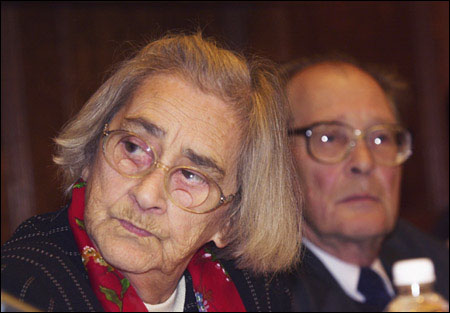Bonner points to still-powerful KGB
Former Soviet dissidents say that present-day Russia shows little improvement over dark days of old regime

Two veterans of Russia’s human rights movement, Elena Bonner and Sergei Kovalev, visited Harvard Nov. 1. But despite all they have risked and suffered since their struggle began in the 1960s, neither was optimistic about the prospects for human rights in Russia today.
“To put it simply, Russia is under the control of the KGB, an organization that has taken the lives of many millions of people,” said Bonner, a former pediatrician and the widow of 1975 Nobel Peace Prize winner Andrei Sakharov (1921-1989).
“Since Putin was elected, the government has implemented a series of steps to gain full control of everything happening in Russia, and so far it’s been very successful,” said Kovalev, a biophysicist who helped found the USSR’s first human rights association, the Initiative Group for the Defense of Human Rights. He is currently chairman of the Memorial Society, Russia’s most prominent human rights organization, and vice chairman of the Andrei Sakharov Museum and Center. Both Bonner and Kovalev spoke in Russian with English translation.

The two activists were here to commemorate the creation of the Sakharov Program on Human Rights and the transfer to Harvard’s Houghton Library of the Andrei Sakharov archive, containing documents, photographs, and audiovisual materials on Sakharov’s work as a physicist, his campaign to limit the testing and proliferation of nuclear weapons, his human rights activities, his influential role in the development of perestroika, as well as the activities of others in the Soviet Union’s human rights movement.
In 1993, Bonner gave the Sakharov archive to Brandeis University, which carried out most of the cataloging and scanning of the collection. Brandeis President Jehuda Reinharz agreed to transfer the archive to Harvard as part of the Davis Center program. The Harvard College Library and the Davis Center for Russian and Eurasian Studies will jointly curate the collection.
Said Timothy Colton, the Morris and Anna Feldberg Professor of Government and Russian Studies and Director of the Davis Center, “Andrei Sakharov was a truly remarkable figure. His papers, along with those of some other leading dissidents from the late Soviet period, add enormously to our research and intellectual resources. We are equally excited that the Davis Center will be the host for the new Sakharov Program on Human Rights. I want to add that we are most grateful to Brandeis University for its stewardship of this marvelous collection over the past 10 years, and for all of its help and support to ensure the collection’s smooth transfer to Harvard.”
Ironically, the visit of Bonner and Kovalev to Harvard occurred near the 30th anniversary of a press conference that Bonner held in her Moscow apartment to make the outside world aware of human rights abuses in the Soviet Union, an event in which Kovalev also participated. Kovalev was arrested soon afterward and served seven years in a labor camp and three years in internal exile. According to Bonner, the present-day Russian government deals with dissent in a more clandestine manner.
“These days, the authorities mask repression with financial or legal charges. This is something that Amnesty International refuses to understand,” she said.
She also accused the Russian government of using the legal system to fleece its citizens of their property. The situation, she said, is like an old joke in which a thug says to his partner: “Look, there’s a raincoat walking down the street.” “Yes,” his partner replies, “but there’s a man inside.” “Well, let’s just shake him out of it.”
“On every level of society,” Bonner said, “there is a process going on of shaking that man out of his raincoat.”
Kovalev said that the goal of the Russian government “is not to deprive every individual of independence, but to create a situation where the individual is aware of the constraints and barriers and learns never to overstep them. You can see the success of this program by the current state of the media and the judicial system. The new goal is to limit the influence of the wealthy when it is not in the interest of the government.”
While both Bonner and Kovalev were pessimistic about the state of Russian society today, they differed somewhat in their predictions for the future.
“It may sound quite terrible what I am going to say, but I believe Russia and the West have missed the opportunity to change the course of events by peaceful means. All the new political movements and new ideas will not be able to change anything because the KGB has taken things firmly into their hands,” Bonner said.
“I disagree,” said Kovalev. “I don’t believe there is such a thing as a moment that is lost forever. I believe that civic society is developing in Russia, but it is still 40 years in the future.”




